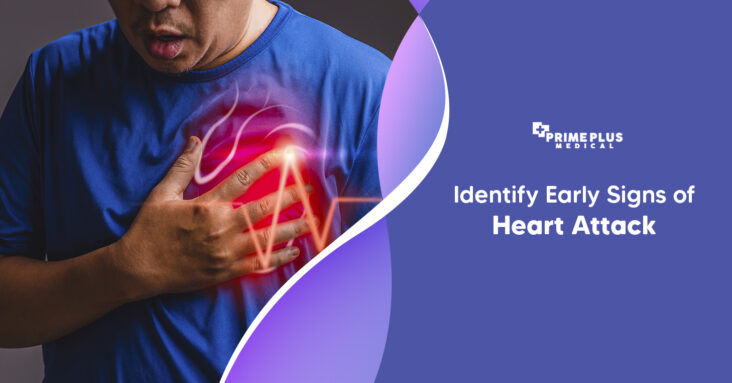In the realm of cardiovascular health, it is of paramount importance to be well-versed in recognizing the signs of heart attack. The signs of heart attack, also medically termed a myocardial infarction, occurs when blood flow to the heart is obstructed, typically due to a coronary artery’s narrowing or complete blockage. Understanding and identifying the signs of a heart attack can be crucial in timely medical intervention and potentially save lives. This article will delve into the intricate details of the signs of heart attack, shedding light on their significance and providing essential insights for prompt action.
Key Symptoms to Watch For if You Have Signs of Heart Attack
Recognizing the signs of heart attack involves a keen awareness of the critical symptoms that often manifest. The onset of a heart attack can vary from person to person, but specific hallmark indicators tend to emerge. Among the most common signs are:
- Chest Pain or Discomfort: One of the primary signals of heart attack is chest pain or discomfort. This sensation is frequently described as chest tightness, pressure, squeezing, or burning. It may last for a few minutes or come and go intermittently.
- Radiating Pain: The pain associated with a heart attack may extend beyond the chest area. It can radiate to the arms (usually the left arm), jaw, neck, back, and stomach. This discomfort in seemingly unrelated areas should not be ignored.
- Shortness of Breath: Another telltale sign is sudden shortness of breath, which can occur with or without chest discomfort. Individuals may find it challenging to catch their breath even during minimal physical activity.
- Nausea and Vomiting: A heart attack can lead to feelings of nausea or vomiting. These symptoms are often more pronounced in women and can be mistaken for indigestion or gastrointestinal issues.
- Cold Sweats and Dizziness: Profuse sweating, often described as “cold sweats,” can arise during a heart attack. Additionally, feelings of lightheadedness or dizziness may occur.
- Fatigue: Unusual and extreme fatigue, unrelated to exertion, can be a warning sign. Individuals experiencing severe fatigue along with other symptoms should exercise caution.
Immediate Action: What to Do?
Upon recognizing these signs, swift action is imperative. Delaying treatment can significantly impact the outcome of a heart attack. If you or someone around you exhibits signs of heart attack, follow these steps:
- Call Emergency Services: Dial emergency services or your local emergency number immediately. Inform the operator of the suspected heart attack and your location.
- Chew Aspirin: If you have aspirin on hand and are not allergic to it, chewing a regular, uncoated aspirin tablet can help mitigate the severity of the heart attack. Aspirin helps to thin the blood and improve blood flow.
- Stay Calm and Rest: While awaiting medical assistance, encourage the individual experiencing the heart attack to stay as calm as possible. Sit or lie down, and avoid exertion.
Read more article Easy Positive Changes for Better Cardiovascular Health
Prevention Signs of Heart Attack and Risk Factors
Understanding the signs of a heart attack is only one aspect of cardiovascular health. Preventive measures and awareness of risk factors are equally crucial. Some common risk factors for heart attacks include:
- Age and Gender: Advancing age and being male is associated with a higher risk of heart attacks. However, heart attacks can affect individuals of any age and gender.
- Smoking: Tobacco use significantly contributes to heart disease and heart attacks. The harmful substances in tobacco can damage blood vessels and increase the likelihood of arterial blockages.
- High Blood Pressure: Uncontrolled high blood pressure can strain the heart and arteries, making them more susceptible to damage and blockages.
- High Cholesterol: Elevated cholesterol levels can lead to plaque formation in arteries, narrowing the pathways for blood flow.
- Diabetes: Individuals with diabetes are at an increased risk of heart disease. Managing blood sugar levels is essential in reducing this risk.
- Family History: A family history of heart disease can elevate an individual’s risk. Genetic predispositions can play a significant role in heart health.
Check Your Heart’s Condition at Prime Plus Clinic
recognizing the signs of a heart attack is a fundamental skill that can make a profound difference in the outcome of a potentially life-threatening situation. By familiarizing oneself with the key symptoms and taking immediate action, lives can be saved and potential complications minimized. Furthermore, a proactive approach to cardiovascular health through risk factor awareness and preventive measures can significantly reduce the likelihood of experiencing a heart attack.
And if you have signs of a heart attack, please consult our GP and get yourself checked, as this is an integral part of maintaining your overall health. Our English-speaking doctors at Prime Plus Medical in Canggu are ready to assist you 24/7.

